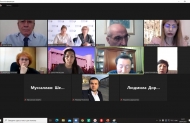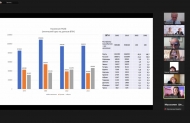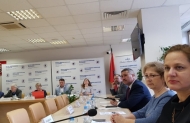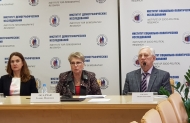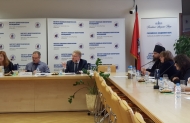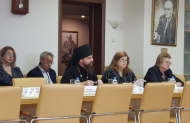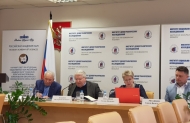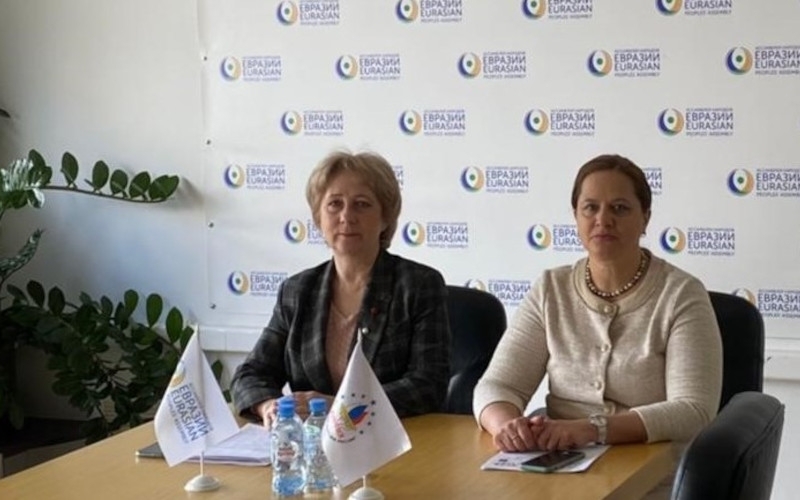
On April 28, 2022, within the International Scientific and Practical Conference "Integration Processes in Eurasia: Intercultural Dialogue and Sociocultural Practices of Interaction", a round table "The role of public organizations in supporting the cultural traditions and spiritual values of the peoples of Eurasia" was held.
Organizers: the Eurasian Peoples' Assembly, the Assembly of peoples’ of Russia, the Institute for Demographic Research, a separate subdivision of the Federal Research Sociological Center of the Russian Academy of Sciences (FNISTS RAS).
Th Round Table included an exchange of views on topical issues and, first of all, on the culture of interpersonal relationship, which represents the spiritual harmony of peoples, their mutual respect and good neighborliness.
The Round Table was moderated by: Victoria LEDENEVA, Chief Researcher of the Institute of Demographic Research of the Russian Academy of Sciences, Chairman of the Committee of the Assembly of peoples of Russia on Social and Cultural Adaptation and Integration of Migrants, Doctor of Sociological Sciences, and Irina POLYAKOVA, Head of the Department of Spiritual Culture of the Eurasian Peoples' Assembly.
The participants were greeted by Svetlana SMIRNOVA, First Deputy Secretary General - Head of the General Secretariat of the Eurasian Peoples' Assembly.
Presentations were made by:
- Tolegen MUKHAMEDZHANOV, Deputy Secretary General of the Eurasian Peoples' Assembly, President of the International Association "Peace through Culture", President of the International Public Foundation "Congress of Spiritual Harmony", Co-Chairman of the World Forum of Spiritual Culture (Kazakhstan);
- Victor KUSIANI, Chairman of the International Non-Governmental Organization Euro-Asian "Alliance" (Georgia);
- Suheil FARACH, Doctor of Philosophy, Academician of the Russian Academy of Education, nominee for the Nobel Peace Prize for 2019 and 2020;
- Mussallam Mohamad SHEAITO, President of the Russian-Arab Cultural Center;
- Elena MAKLASHOVA, Deputy Director for Science, Institute for Humanitarian Research and Problems of Indigenous Peoples of the North, Siberian Branch of the Russian Academy of Sciences, Doctor of Sciences in Sociology;
- Victoria LEDENEVA, Chief Researcher at the Institute for Demographic Research of the Russian Academy of Sciences, Chairman of the Committee of the Assembly of peoples of Russia on Socio-Cultural Adaptation and Integration of Migrants, Doctor of Sciences in Sociology;
- Adina TENGEBAYEVA, President of the Charitable Foundation Bureau "Firebird";
- Theodora YANNITSI, Director of the Greek Cultural Center, Candidate of Historical Sciences, actress;
- Natalia STEPANOVA, Chairman of the Council of the Omsk regional branch of the Assembly of peoples of Russia, Director of the Omsk House of Friendship;
- Abubakr Khasanovich RAKHMONOV, Candidate of Economic Sciences, senior researcher at the Institute for Demographic Research of the Russian Academy of Sciences.
The participants of the Round Table considered and discussed the issues of contact of cultures and creative dialogue of peoples in strengthening stability in the development of interethnic relations, their important role in the integration processes in the Eurasian space. As a result of the Round Table, a Resolution was adopted.
The International Scientific and Practical Conference "Integration Processes in Eurasia: Intercultural Dialogue and Sociocultural Practices of Interaction" was held in Moscow from 27 to 29 April. Main organizers: Institute for Demographic Research of the Federal Scientific Research Center of the Russian Academy of Sciences, Institute of Socio-Political Research of the Federal Scientific Research Center of the Russian Academy of Sciences, Federal Research Sociological Center of the Russian Academy of Sciences. A number of universities and public organizations of Eurasian countries, including the Eurasian Peoples' Assembly and the Assembly of peoples of Russia, acted as co-organizers. The conference addressed issues of forming the image of the future Eurasian space, the ideals of a man of the third millennium, new formats of socio-cultural interaction between peoples.



